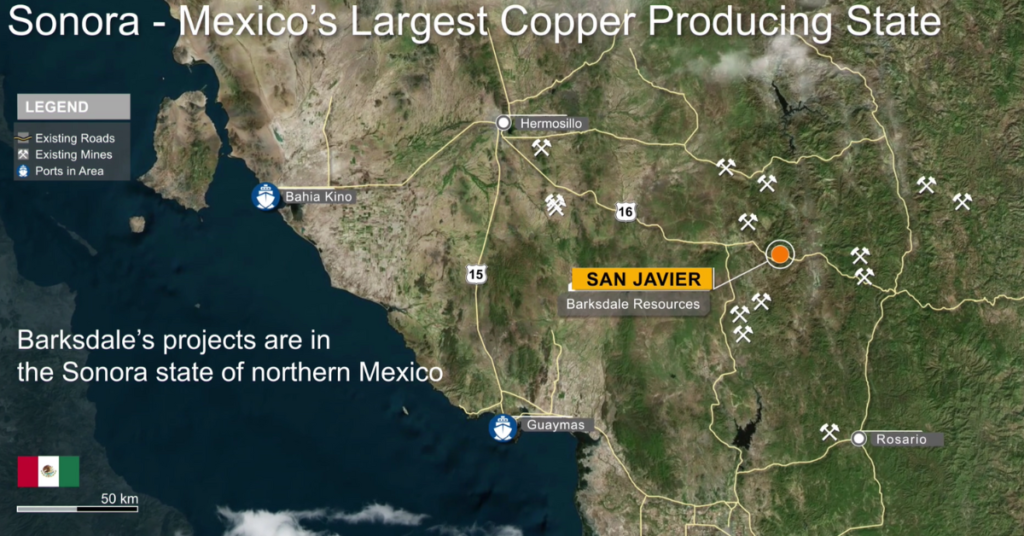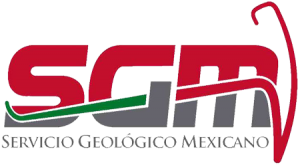Vancouver, British Columbia–(Newsfile Corp. – June 7, 2022) – Barksdale Resources Corp. (TSXV: BRO) (OTCQX: BRKCF) (“Barksdale” or the “Company“) is pleased to report positive results from its first phase of metallurgical test work on copper mineralization at the San Javier copper-gold project located in Sonora, Mexico. A comprehensive testing program was completed in eight column tests utilizing material sourced from four large-diameter diamond core holes that were drilled by Barksdale in August and early September of 2022. The objective of the program was to help guide optimum processing options for the project. Test work was completed by McClelland Labs Inc under the supervision of Steve Dixon, a metallurgical consultant to the Company.
Press Release Highlights
- Extraction of acid soluble copper ranged between 77% and 93% for oxide dominant samples
- Extraction of acid and cyanide soluble copper ranged between 72% and 89% for oxide dominant samples
- Copper recovery was still increasing in all samples at the conclusion of the 120-day column tests, indicating the potential for residual copper extraction
- Test work indicated that acid curing and agglomeration is likely not required as the acid cured samples did not extract more copper than using raffinate alone
- Future tests will focus on optimizing operating parameters such as lift height and cycle times as well as to determine the effectiveness of coarser crushing
Rick Trotman, President and CEO of Barksdale, commented: “The results of the San Javier column leach testing program have demonstrated strong recoveries of oxide copper while also shedding considerable light on the potential for a low-cost style operation that doesn’t require agglomeration and has low acid consumption. These initial metallurgical recovery parameters will assist in the calculation of our initial resource at Cerro Verde and will also feed into a preliminary economic study. We are very excited to continue pushing this project forward in a highly constructive copper price environment.”
2021/2022 Metallurgical Testing Program
The metallurgical test program was conducted at McClelland Laboratories, Inc. in Reno, Nevada, under the supervision of Jack McPartland, Metallurgist / President at McClelland, with additional oversight by Steve Dixon, Barksdale’s consulting metallurgist.
The San Javier copper deposit contains predominately oxide copper mineralization with isolated zones of sulfides and mixed oxide/sulfide mineralization. Four composites representing three oxide and one sulfide dominant mineralized zone were evaluated by column leach tests to see the impacts of an acid cure on the extraction of copper for material crushed to a P80 of 25mm (1.0 inch). Each composite had two column tests – one column was acid agglomerated with a 5.0 kilogram per tonne acid cure and the other column was completed without an acid agglomeration cure. Acid agglomeration is an operating process where ores are pretreated with acid and cement prior to being stacked on a heap leach pad in order to maximize copper recoveries and prevent degradation of the leach pad’s physical characteristics. This process can add significant processing costs.
Raffinate used for the tests contained 5 grams per liter of sulfuric acid and the irrigation rate was 6 L/hr/m2. The primary irrigation time was 120 days, after which the columns were washed and rinsed for 4-5 days and then unloaded, screened, and assayed. Table 1 presents the eight test conditions:
| Test | Column | Composite | Acid Cure | Acid Raffinate |
| kg/t | g/l | |||
| 1 | CL-1 | 4726-001 | 0 | 5 |
| 2 | CL-2 | 4726-001 | 5 | 5 |
| 3 | CL-3 | 4726-002 | 0 | 5 |
| 4 | CL-4 | 4726-002 | 5 | 5 |
| 5 | CL-5 | 4726-003 | 0 | 5 |
| 6 | CL-6 | 4726-003 | 5 | 5 |
| 7 | CL-7 | 4726-004 | 0 | 5 |
| 8 | CL-8 | 4726-004 | 5 | 5 |
Table 1. Test conditions of the eight column tests.
Oxide Results
The feed grades of each copper class in each oxide dominate composite, determined by size analysis, are presented in Table 2 as well as the percentage of acid soluble and cyanide soluble copper for each composite. The insoluble copper fraction contains copper sulfides that are not soluble by acid or cyanide in shake test procedures (mainly chalcopyrite).
| Test | Composite | Total Copper | Acid Soluble | Cyanide Soluble | Insoluble | Acid Soluble | Cyanide Soluble | Insoluble |
| Cu% | Cu% | Cu% | Cu% | % | % | % | ||
| 3 & 4 | 4726-002 | 0.60% | 0.53% | 0.05% | 0.02% | 88.4% | 8.5% | 3.1% |
| 5 & 6 | 4726-003 | 0.39% | 0.35% | 0.01% | 0.02% | 90.6% | 3.4% | 5.9% |
| 7 & 8 | 4726-004 | 0.64% | 0.52% | 0.01% | 0.11% | 81.0% | 1.9% | 17.0% |
Table 2. Grade profile of the three oxide dominant composites.
Copper recovery for oxide dominate mineralization was quite good, with extraction of acid soluble copper ranging between 77% and 93% while extraction of acid and cyanide soluble copper ranged between 72% and 89%.
| Test | Column | Composite | % of Total Copper | % of Acid Soluble Copper | % of Acid and Cyanide Soluble Copper |
| 3 | CL-3 | 4726-002 | 79% | 84% | 76% |
| 4 | CL-4 | 4726-002 | 78% | 79% | 72% |
| 5 | CL-5 | 4726-003 | 82% | 93% | 89% |
| 6 | CL-6 | 4726-003 | 81% | 84% | 81% |
| 7 | CL-7 | 4726-004 | 68% | 84% | 82% |
| 8 | CL-8 | 4726-004 | 68% | 77% | 76% |
Table 3. Copper extraction from the six oxide dominant column tests.
Copper extraction was still climbing for all composites after the full irrigation program was completed, pointing to the potential for continued extraction of copper in the second cycle of irrigation once a new lift is place on the ore that completed the first cycle of irrigation. Additional tests will be completed that focus on evaluating optimal timing of the primary and secondary leach cycle times.

Figure 1. Recovery performance and net acid consumption of the Cerro Verde oxide dominate composite samples. Two column tests were completed for each composite, which are represented in each graph as “blue lines” (no acid cure) and “red lines” (acid cure). Recovery curves were still increasing at the end of the 120-day column tests.
To view an enhanced version of Figure 1, please visit:
https://orders.newsfilecorp.com/files/8531/126707_7ac90206b44d1863_002full.jpg
The columns that contained an acid cure provided faster recovery of copper during the first 30-60 days of irrigation but ultimately did not extract more copper than using raffinate alone. Additionally, net acid consumption in all samples was lower using only raffinate than those that also had an acid cure. Overall net acid consumption on non-cured oxide samples ranged between approximately 2 and 3 kilograms per tonne. Low net acid consumption can significantly reduce operation costs of heap leach operations.
Sulfide Results
While the Cerro Verde deposit predominately contains oxide copper mineralization, there are zones of both sulfide dominate and mixed oxide/sulfide mineralization where understanding the metallurgical response is warranted. Composite 4726-001 contained a higher insoluble copper content than the other composites at Cerro Verde and the results of the column leach tests utilizing this composite demonstrate that the use of soluble copper assays in future ore control programs will likely be very effective in identifying the sulfide zones, which will allow the Company to only place material on the heap leach pad if the recoverable copper estimates meet the required cut-off grades based on copper recovery, acid consumption, and metal prices.
| Test | Composite | Total Copper | Acid Soluble | Cyanide Soluble | Insoluble | Acid Soluble | Cyanide Soluble | Insoluble |
| Cu% | Cu% | Cu% | Cu% | % | % | % | ||
| 1 & 2 | 4726-001 | 0.42% | 0.08% | 0.15% | 0.19% | 18.5% | 35.4% | 46.2% |
Table 4. Grade profile of the sulfide dominant composite.
Acid soluble recoveries were well above 100% for composite 4726-001, which suggests that the acid soluble grades may have been underreported via the shake test procedures completed at the assay laboratory, given the relatively short duration of the laboratory test (1-hour) versus the 120-day column test. Overall recoveries of both acid and cyanide soluble copper were between 51% and 58% and the recoveries were still increasing at the end of the 120-day irrigation cycle.
| Test | Column | Composite | % of Total Copper | % of Acid Soluble Copper | % of Acid and Cyanide Soluble Copper |
| 1 | CL-1 | 4726-001 | 27% | 170% | 58% |
| 2 | CL-2 | 4726-001 | 31% | 148% | 51% |
Table 5. Copper extraction from the sulfide dominant columns.
The column that contained an acid cure provided faster recovery of copper during the first 15 days of irrigation but ultimately did not extract more copper than using raffinate alone. Additionally, net acid consumption was lower using only raffinate (~22 kg/t) compared to the column that also had an acid cure (~25 kg/t). Overall net acid consumption on non-cured oxide samples ranged between approximately 2 and 3 kilograms per tonne. Additional test work will look at larger crush sizes and longer cycle times for sulfide mineralization (>300 days).

Figure 2. Recovery performance and net acid consumption of the Cerro Verde sulfide dominate composite. Two column tests were completed for the composite, which are represented in each graph as “blue lines” (no acid cure) and “red lines” (acid cure). Recovery curves were still increasing at the end of the 120-day column tests.
To view an enhanced version of Table 2, please visit:
https://orders.newsfilecorp.com/files/8531/126707_7ac90206b44d1863_003full.jpg
Future Work
Future metallurgical test work will focus evaluation of heap leach lift heights and primary cycle times to optimize the copper in solution and acid consumption parameters. Additionally, bulk samples should be used to evaluate increased crush size beyond 25mm (1 inch) on the acid and cyanide dominate mineralization. With regards to sulfide dominant mineralization, an evaluation of crush size should be completed that also extends leach cycle times of >300 days. This will assist in determining the economics of leaching sulfide dominate mineralization.
Scientific and technical information in this news release has been reviewed and approved by Steve Dixon, a metallurgical consultant to the Company and a ‘Qualified Person’ as defined under Canadian National Instrument 43-101.
Barksdale Resources Corp. is a base metal exploration company headquartered in Vancouver, B.C., that is focused on the acquisition, exploration and advancement of highly prospective base metal projects in North America. Barksdale is currently advancing the Sunnyside copper-zinc-lead-silver and San Antonio copper projects, both of which are in the Patagonia mining district of southern Arizona, as well as the San Javier copper-gold project in central Sonora, Mexico.
ON BEHALF OF BARKSDALE RESOURCES CORP
Rick Trotman
President, CEO and Director
[email protected]
Terri Anne Welyki
Vice President of Communications
778-238-2333
[email protected]
For more information please phone 778-238-2333, email [email protected] or visit www.BarksdaleResources.com.
Neither the TSX Venture Exchange nor its Regulation Services Provider (as that term is defined in the policies of the TSX Venture Exchange) accepts responsibility for the adequacy or accuracy of this news release.
CAUTIONARY STATEMENT REGARDING FORWARD-LOOKING INFORMATION: This news release includes “forward-looking information” under applicable securities legislation including, but not limited to, the ability of Barksdale to achieve metallurgical recoveries of copper and gold at San Javier. Such forward-looking information reflects management’s current beliefs and is based on a number of estimates and assumptions made by and information currently available to the Company that, while considered reasonable, are subject to known and unknown risks, uncertainties, and other factors which may cause the actual results and future events to differ materially from those expressed or implied by such forward-looking information. Readers are cautioned that such forward-looking information is neither a promise nor guarantee, and is subject to known and unknown risks and uncertainties including, but not limited to, delays in obtaining governmental or third party approvals and permits, actual results of exploration activities, unanticipated geologic formations, structures and characteristics, environmental risks, future prices of base and other metals, operating risks, accidents, labor issues, and other risks in the mining industry as well as general business, economic, competitive, political and social uncertainties, uncertain and volatile equity and capital markets and lack of available capital. There are no assurances that the Company will obtain the necessary permits for and successfully complete the proposed technical and drill program at San Javier as currently contemplated or at all. In addition, there is uncertainty about the spread of COVID-19 and variants of concern and the impact they will have on the Company‘s operations, supply chains, ability to access mineral properties, conduct due diligence or procure equipment, contractors and other personnel on a timely basis or at all and economic activity in general. All forward-looking information contained in this news release is qualified by these cautionary statements and those in our continuous disclosure filings available on SEDAR at www.sedar.com. Accordingly, readers should not place undue reliance on forward-looking information. The Company disclaims any intention or obligation to update or revise any forward-looking information, whether as a result of new information, future events or otherwise, except as required by law.
Original Article: https://www.newsfilecorp.com/release/126707






















